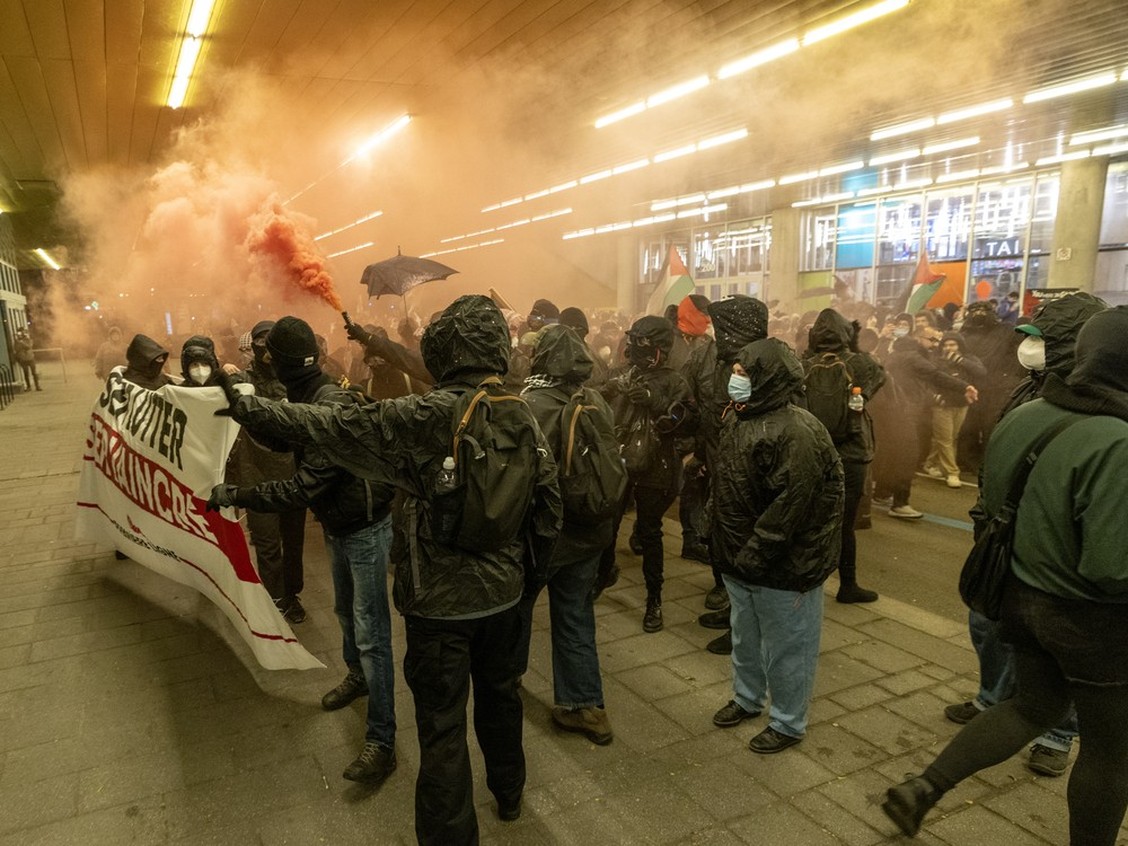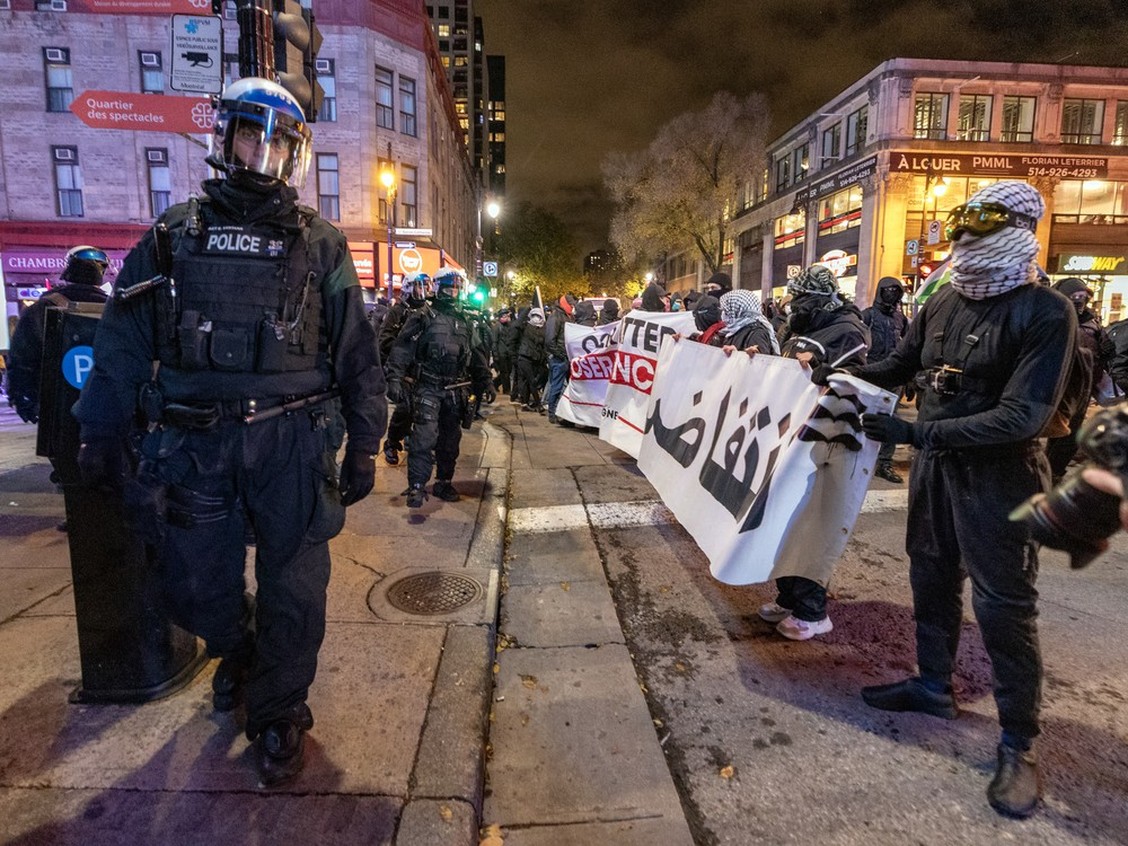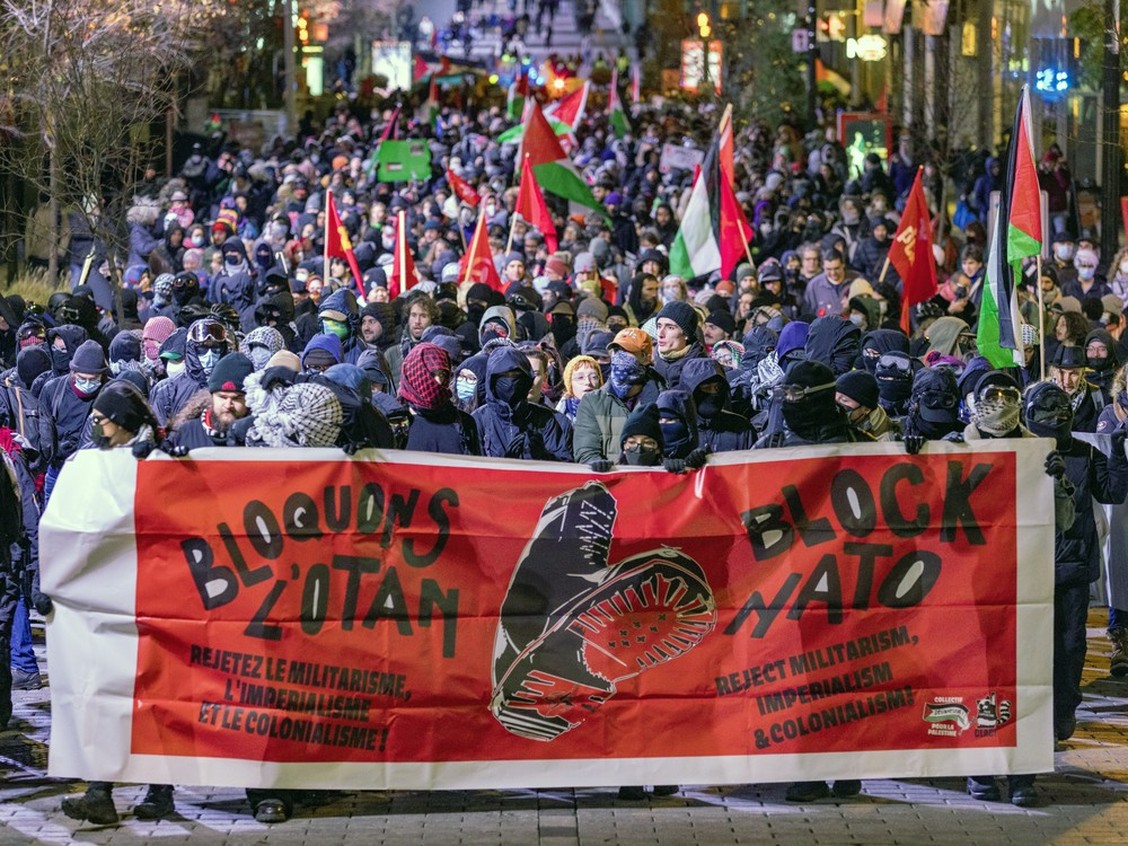Montreal has found itself in the spotlight over the past weekend as protests against NATO and its policies escalated into violence, leaving a trail of destruction in the city. The protests, which aligned with the arrival of high-profile NATO delegates, were sparked by frustrations over global conflicts, particularly the situation in Gaza. Meanwhile, Canadian Prime Minister Justin Trudeau faced backlash for attending a Taylor Swift concert in Toronto during the chaos, drawing criticism for his apparent lack of engagement with events unfolding in his home district.

A protester holds a smoke torch during demonstration by the Collectif Désinvestir pour la Palestine and the Convergence des luttes anticapitalistes (CLAC) in Montreal Friday Nov. 22, 2024. John Mahoney /Montreal Gazette
The protests began late Friday afternoon with demonstrators gathering in downtown Montreal at locations like Émilie-Gamelin Parc and Place des Arts. Organized by groups such as Divest for Palestine and the Convergence of Anti-Capitalist Struggles, these demonstrations initially aimed to highlight NATO’s involvement in global conflicts, which protesters linked to rising instability in the Middle East and Eastern Europe.
As the evening progressed, tensions escalated. Smoke bombs were deployed, vehicles were set ablaze, and windows of businesses were smashed. An effigy of Israeli Prime Minister Benjamin Netanyahu was burned, symbolizing protesters’ condemnation of Israeli military actions in Gaza. Police were forced to deploy chemical irritants to disperse the crowds as violence unfolded near St-Urbain Street and René-Lévesque Boulevard.
The violence coincided with a NATO summit in Montreal, where delegates gathered to discuss pressing global issues, including the ongoing war in Ukraine, climate change, and NATO’s strategic future. The juxtaposition of this high-profile meeting with street-level protests underscored the growing divisions within Canadian and global society regarding foreign policy and military alliances.
Montreal police arrested three individuals during the Friday protests, charging them with assaulting officers and obstructing police work. While the crowd largely dispersed by early evening, the damage was significant, with several vehicles burned and local businesses left to deal with shattered windows.
What we saw on the streets of Montreal last night was appalling. Acts of antisemitism, intimidation, and violence must be condemned wherever we see them.
The RCMP are in communication with local police. There must be consequences, and rioters held accountable.
— Justin Trudeau (@JustinTrudeau) November 23, 2024
On Saturday, Prime Minister Trudeau and other political leaders condemned the violence. Trudeau described the scenes as “appalling” and emphasized the need for consequences, stating, “Acts of antisemitism, intimidation, and violence must be condemned wherever we see them.”
Federal cabinet ministers Mélanie Joly and Bill Blair echoed these sentiments, labeling the protests as acts of “anarchy” and condemning the antisemitic undertones they associated with the demonstrations. However, protesters pushed back against these accusations, asserting that their actions were directed at NATO policies and Israel’s government, not Jewish people.

Riot police line the sidewalk on St-Laurent Blvd. Photo by John Mahoney /Montreal Gazette
The Montreal unrest reflects growing frustrations among Canadians regarding the country’s foreign policy. Protesters criticized NATO’s perceived complicity in conflicts such as the war in Gaza, accusing member states of enabling Israeli military actions that have led to civilian casualties. Benoît Allard, a member of Divest for Palestine, called attention to the International Criminal Court’s recent accusations against Netanyahu, which allege war crimes and crimes against humanity.
The protests were part of a larger wave of pro-Palestinian demonstrations across Montreal, including campus actions earlier in the week at Concordia University. These events, marked by clashes between pro-Palestinian and pro-Israel groups, highlight the deepening polarization around the Israel-Palestine conflict within Canadian society.
As Montreal descended into chaos on Friday night, a video of Prime Minister Trudeau dancing at a Taylor Swift concert in Toronto went viral, drawing widespread criticism. Social media users compared Trudeau to Emperor Nero, accusing him of metaphorically “fiddling while Rome burned.” Critics saw this as emblematic of a leadership style that appears detached from urgent domestic concerns.
Trudeau at a Taylor Swift concert while Montreal burns.pic.twitter.com/biFD1CEva0
— Defiant World (@DefiantWorld) November 23, 2024
Members of Parliament, including Conservative MP Don Stewart, condemned Trudeau’s actions. Stewart’s post on social media criticized the prime minister for celebrating at a concert while violent protests raged in Montreal. “Lawless protesters run roughshod over Montreal in violent protest. The Prime Minister dances,” Stewart wrote, highlighting what he called a failure in leadership.
Trudeau’s defenders argued that attending a concert does not necessarily equate to neglecting his duties, but the optics of the situation fueled frustration among Canadians already disillusioned with his government.

Anti-Israel and Anti-Nato protestors in Montreal (Alamy)
While political leaders from across the spectrum condemned the violence, debate persists about the appropriateness of the protest tactics. Critics, including Quebec Premier François Legault, argued that burning cars and smashing windows undermined the legitimacy of the protesters’ message. “Such acts have no place in a peaceful society like Quebec,” Legault stated.
Conversely, protest organizers defended their actions as a necessary response to what they see as Canada’s complicity in global injustices. Divest for Palestine and other groups emphasized that their demonstrations were not anti-Semitic but aimed at challenging policies that perpetuate violence in the Middle East.
Rana El Gharbie, another protester, acknowledged the frustration driving many Canadians to take to the streets but expressed regret over the violent turn. “Canadians are becoming increasingly frustrated by Canada’s support for Israel and lack of action in protecting Palestinians,” she said.

Demonstrators fill Ste-Catherine St. during Friday’s protet. Photo by John Mahoney /Montreal Gazette
The events in Montreal highlight broader challenges facing Canada as it grapples with international crises and domestic unrest. The protests against NATO, coupled with pro-Palestinian demonstrations, reflect dissatisfaction with Canada’s foreign policy and a desire for a more independent and peace-oriented stance.
The incident also underscores the growing polarization in Canadian politics. While Trudeau’s government faces criticism from both the right and left, opposition leaders like Conservative Party head Pierre Poilievre have seized on moments like the Taylor Swift concert video to question the prime minister’s priorities and leadership.
Complete lawlessness in Montreal as the Pro-Hamas terror mobs emboldened by the Trudeau Liberals destroy the PM’s own hometown.
Rioters on a violent rampage and not a single word from our government. They only act when you disagree with them.
Bring back law and order, safe… pic.twitter.com/jz2YVKBtL9
— Melissa Lantsman (@MelissaLantsman) November 23, 2024
As Montreal recovers from a weekend of unrest, questions remain about how Canada can address the concerns raised by protesters while maintaining public order. Political leaders have called for accountability for those responsible for the violence, but resolving the underlying issues will require broader dialogue and policy shifts.
The juxtaposition of violent protests and Trudeau’s concert attendance serves as a microcosm of the challenges facing Canada: a country trying to balance its international commitments with domestic pressures, all while navigating a deeply divided political landscape. Whether this weekend’s events will lead to meaningful change or further entrench divisions remains to be seen.

